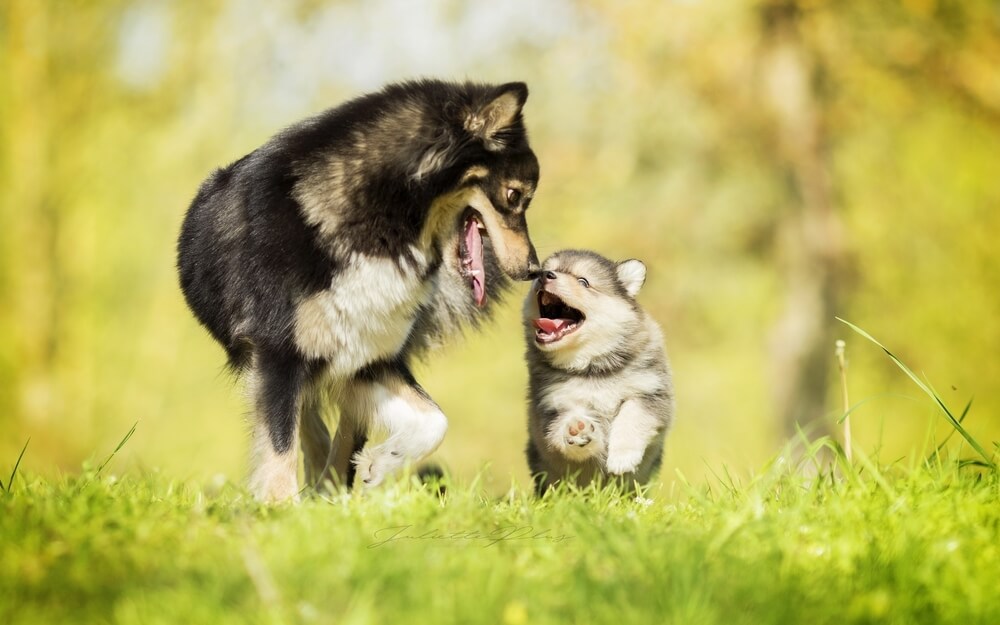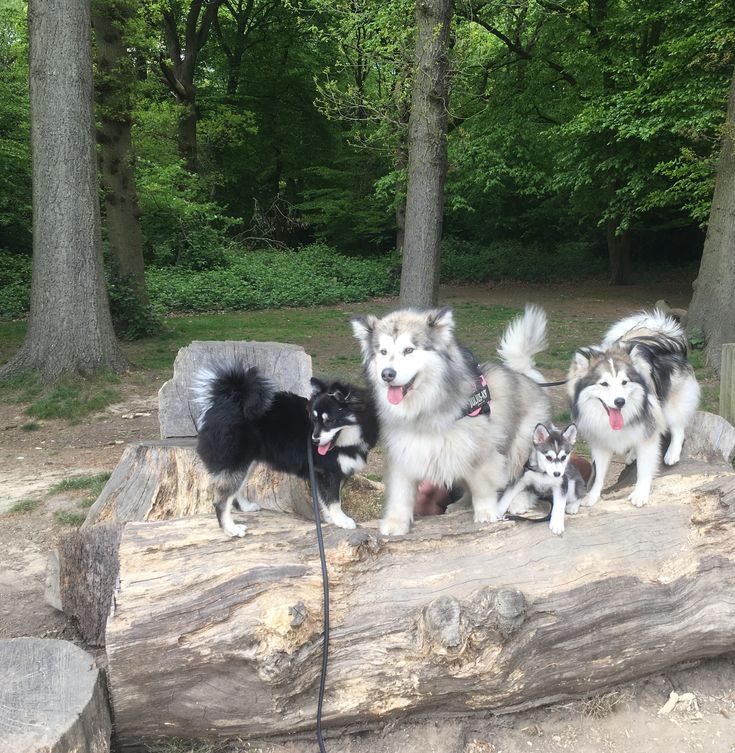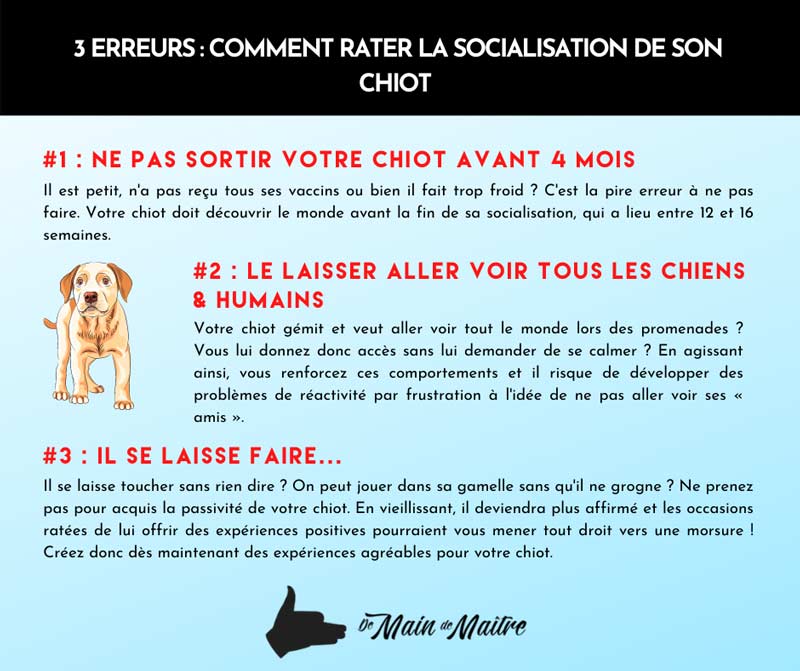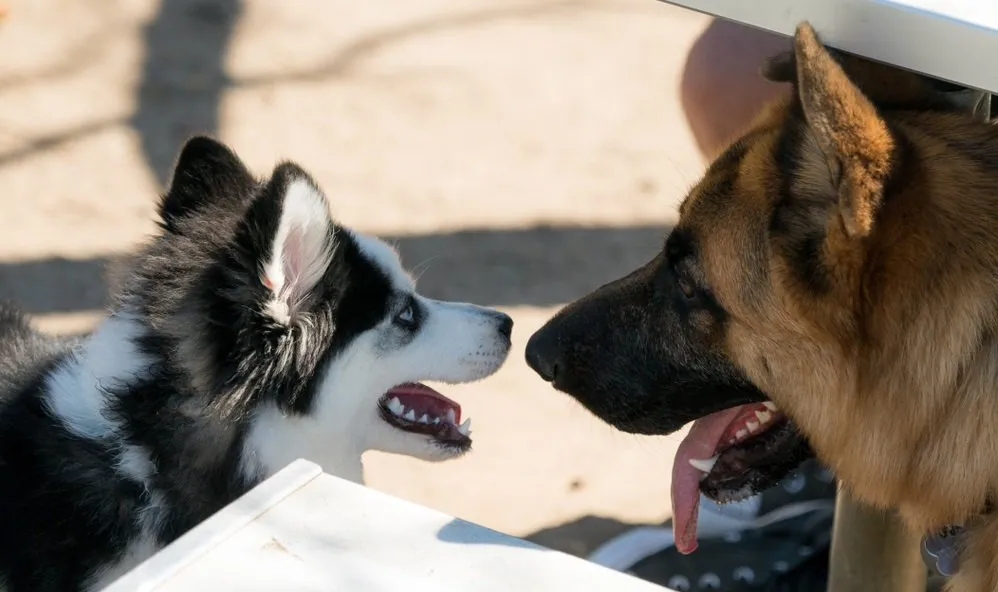The importance of socialisation
How can you ensure that your puppy is able to play with all the dogs he meets, but is also able to remain neutral in front of the dogs when he is with you in town?
Depending on your puppy's temperament and future life, here are a few tips to help you make your pomsky sociable.
Why is it essential to socialise your puppy well with other dogs?
Socialising your pomsky with other dogs is a crucial stage in his development. Your puppy will be living in your home, which is mainly made up of humans, but he is expected to be able to react correctly to his own kind, respecting them and not fearing them.
Between the age of 8 and 12 to 16 weeks, the period when your puppy comes into your life, he is at a sensitive stage in his development and socialisation. The connections between his neurons are developing strongly, and any new experience is permanently recorded. This sensitive period also allows your puppy to be fairly resilient to new experiences, as long as they do not exceed his tolerance threshold and are not, of course, traumatic.

After this so-called socialisation period, which ends between 12 and 16 weeks depending on the puppy, the number of neuronal connections created decreases and those that have not been stimulated simply disappear. A puppy that has received little stimulation will be less tolerant of new experiences. You should also be aware that, after this socialisation phase, there follows a phase of fear, which varies from one individual to another.
A puppy who has not met any dogs during this period, or who has had bad experiences with them, may develop a real phobia towards other dogs and react out of fear.
So, socialising your puppy to other dogs is something that happens from the very first days you take him in! Note that, depending on your puppy's temperament, you'll find that the order and frequency of the exercises you do may vary. In fact, an extroverted puppy does not have the same challenges as a rather shy puppy to feel at ease!
5 myths about puppy socialisation
There are still many myths about the socialisation of puppies with other dogs, which unfortunately do a great deal of damage to the dogs' future behaviour.
1 - The puppy needs to meet as many dogs as possible
In many people's minds, socialising means exposing your puppy to a large number of dogs, sometimes in sub-optimal ways (on a lead, with all the dogs you meet in the street, etc.).
This is something that was regularly suggested before. Although your puppy met a lot of dogs, how many of them communicated properly? What did he learn?
Instead, it's important to focus on the quality of the interactions. The dogs with which your puppy will interact must be selected for their good communication skills, with interaction in the wild or on a lead in a safe, supportive environment.

If your exuberant, sociable puppy is allowed to meet every dog on the street on a lead, how will he understand that there will come a time when this is no longer allowed? When your dog becomes an adolescent, you won't necessarily want to stop and say hello to all the dogs. Your puppy may then develop reactivity out of frustration with other dogs.
Similarly, if your shy, observant puppy has to go up to every dog he meets in the street to socialise, how will he let us know he wants to go more slowly? He may then react out of fear.
2 - My puppy can't meet other dogs until he's been vaccinated
As we saw above, the socialisation window ends between 12 and 16 weeks of age, i.e. when your puppy is around 3-4 months old. It's also at 4 months of age that your puppy receives his last vaccination.
If we weigh up the risks associated with dog abandonment and euthanasia against the risks of actual contamination of the puppy... the former outweigh the latter!
It's important to know that the mother passes on to her puppies a number of antibodies (for diseases to which she is immune) that protect them from infection. Your puppy's breeder will also have taken the puppies to the vet for their first vaccinations.
The puppy that arrives at your home benefits from these antibodies as well as his first vaccination. He's well enough protected to discover his environment! This doesn't mean you shouldn't vaccinate your puppy or worm him against parasites. Vaccination is essential for dogs and puppies.
If in doubt, ask whether the dogs you wish to meet are in good vaccination order and avoid meeting them in areas saturated with droppings. It's also possible to keep your distance and create positive associations with dogs!
3 - The dog park is the ideal place to socialise your puppy
The dog park seems to be the ideal place for some great canine encounters, with several dogs playing together! But take a close look at the canine interactions that take place there: the dogs are mainly adults, they sometimes play rough, there can be a lot of them, and the rules of play are not always respected...
The risks of your puppy making bad associations with dogs are enormous: a swarm of curious adult dogs running up to him to get to know him, an encounter with a dog that doesn't like puppies, etc.
Once again, you need to select the dogs that will meet your puppy! The dog park is best suited to outgoing adolescent or adult dogs who enjoy active doggy encounters (dog-to-dog play sessions).

4 - Exposing my fearful puppy to other dogs to get him used to them
If your puppy is rather shy, offering him repeated interactions won't really help him.
Observe: does its behaviour change significantly and positively between two interactions? Does he manage to show real social behaviour and play in a balanced way with his fellow dogs? If the answer is no, it's possible that the puppy is in the process of creating a bad association, getting used to it, becoming sensitised or immersed in an experience from which it can't escape.
This can make your puppy even more fearful of other dogs and even break his trust in you. You can even see puppies in a state of acquired distress following situations from which they cannot escape.
Train yourself to detect your puppy's stress signals and respect his rhythm to avoid immersing him in an unpleasant situation.
You can create positive associations using treats! Rewarding a scared dog won't increase his fear, but will actually help him create a more positive association with other dogs! You can even give your puppy a hug if he's too scared to take the food. Move him away from the source of his fear and work at a greater distance.
For shy or scared puppies, don't hesitate to introduce them to particularly calm dogs who won't invade your pooch's space.
5 - Age doesn't matter when it comes to dog-to-dog socialisation
Some trainers who use traditional methods will recommend socialising dogs that are reactive to other dogs out of fear.
After the socialisation period, which ends between 12 and 16 weeks, we have seen that the number of neuronal connections decreases. However, this does not mean that everything is over, and fortunately so! The brain can still create links between neurons throughout life, but this takes much longer, and we are no longer talking about socialisation.
Once the socialisation period is over, we can work on creating better associations from a distance or with the help of a professional, but beware of professionals who recommend socialising your adult dog so that he likes other dogs!

How do you socialise your puppy effectively with other dogs?
Not all ways of socialising a puppy are created equal. In fact, each puppy and each environment will influence the ideal way to socialise.
Organise a play session with a dog friend of the same age
Playing with another puppy is an excellent idea to keep him busy and allow him to practise his dog language skills and bite inhibition, as he learned in his litter.

However, it must never be done without human supervision. On the one hand, the game can become unbalanced if communication is not respected, and on the other hand, with fatigue, the quality of the game can also deteriorate, and you end up with totally over-stimulated puppies who have difficulty reading each other's language.
It should be possible to organise play sessions between two puppies at a time, selecting similar temperaments to achieve a balance in the interaction.
Similarly, we prefer to let puppies of similar size interact with each other. A German Shepherd could break the paw of a little Pomsky puppy when they're just playing.
What should I do if one of the puppies seems to be playing too hard?
As mentioned above, puppy play should never take place without active human supervision. Depending on the temperament of the puppies and their experiences, totally uncontrolled interactions are rarely beneficial to them.
If one of the puppies seems to overwhelm his friend, or does not seem to respect his friend's requests for a break, then a consent test should be carried out.
This test is carried out quickly: the puppy in question is held for a few seconds to interrupt the interaction. If the puppy, who seemed overwhelmed, comes back to play, it was indeed a game for him.
If the puppy who seemed overwhelmed moves away, he no longer wanted the interaction. In this case, it is necessary to distract the so-called nagging puppy to take his mind off things before resuming the interaction, or even to give him a few moments of rest. It's not uncommon for a tired puppy to start nagging his playmate, so it's important to think about this and, if necessary, stop the play session and postpone it.
How can I find puppies to organise play sessions?
Here are some ideas for finding playmates for your puppy:
- Make a request on a Facebook group, for example in our Gironde region, we have the groupe balade canine 33
- Check with people you know to see if anyone has adopted a puppy.
- Ask your dog trainer if he has any other puppies in training that would make good playmates.
Teaching your puppy to ignore other dogs
Not every dog you meet on the street wants to meet your puppy. What's more, meeting dogs on a lead is generally not recommended, as the short lead prevents the dogs from communicating well with each other.
Teaching your puppy not to go to every dog, not just the reactive ones, is therefore an extremely important exercise that is an integral part of your puppy's socialisation.
In fact, if you let your puppy systematically go after every dog he meets, getting excited to go, it's highly likely that you'll unintentionally create reactivity out of frustration, when for one reason or another it won't be possible to go and see that dog!
On the one hand, you should avoid giving access to another dog if your puppy is totally overexcited and out of control. He needs to learn to be relatively calm before meeting another dog (by walking him at a distance, for example), as this can lead to a fight if you let him go while he's overexcited and he lunges at another dog.
On the other hand, you can work at a distance from these dogs and create positive associations with treats: "when I see a dog, I look at my master and I get treats, so cool! When there are many successes at a certain distance, you can then reduce it.
It's also possible to combine the presence of dogs with games with you, or pleasant obedience exercises or scent searches.
Successfully socialising your puppy to avoid behavioural problems
A "fresh" puppy who knows nothing about life can only rely on his genetics and the work of his breeder to cope with life's experiences. Of course, genetics and the breeder's work help a great deal and get you started in the right direction, but socialisation remains essential.
Unfortunately, few dogs are so resilient that they are able to face unknown experiences outside the socialisation period with complete serenity. Your socialisation work, based on these fundamental points, will enable you to prepare your puppy for his future life and give you every chance of having a dog that's at ease with itself.
Measuring your puppy's progress
Make sure you expose your dog to all the situations in the table below, preferably every week.
When he's calm and happy, reward him with attention, cuddles and treats.
If he's worried or hesitant, reassure him calmly. Distract him with a toy or a treat and, the next time, give him a little more distance.
Sources : Audrey Boucquey - demaindemaitre.ca
Interested in adopting a Pomsky puppy?
Come and see if we have any puppies available at the moment.